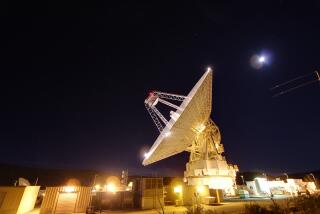Aerospace /Some View Future With Optimism, but Budget Cuts Are a Concern
- Share via
Orange County aerospace executive Jeff Amacker is looking forward to the year 1995. It’s all those years in between that have him worried.
“The mid-1990s look real good for us,” said the chairman of Leach Corp., a Buena Park aerospace electronics company. “I’m concerned about the period from 1988 to the mid-1990s.”
Leach and other county aerospace officials are concerned that the long-anticipated downturn in the industry will take hold in 1988 as the massive defense buildup undertaken by the Reagan Administration slows.
Leach’s concerns are reflected in a Chapman College economic forecast for 1988 that predicts the first decline in the county’s aerospace employment since 1982. The aerospace industry is the county’s largest employer, providing 94,300 jobs.
The report estimates that county aerospace employment will decline by 1.5%--or 1,500 jobs--next year. Since 1984, the growth rate in county aerospace jobs has declined from 10.3% to an estimated 1.4% in 1987.
Aerospace contractors are worried that big cuts in Pentagon spending will eliminate existing programs and make it difficult to start new ones. Some contractors hope to take up some slack by expanding their commercial business.
“We’ve got a smaller defense budget staring us in the eyeballs, which we believe will be the case no matter which party ends up in the White House,” said Ron K. Ressler, vice president of business development for Ford Aerospace & Communications’ Aeroneutronics division in Newport Beach.
“We recognize that our industry has a tough three or four years ahead of us,” Ressler added. “I personally believe there may be some shakeout, particularly among smaller companies” dependent on a few government contracts for most of their business.
Recent budget cuts “will take about two years to filter down,” Leach’s Amacker said. “We think the downturn is not going to be too severe. We think we can fill the gap. The growth in electronics on almost everything that flies (both commercial and military) means we have a whole new business area.”
The Leach chief executive is more optimistic about the middle of the next decade because he believes that production on several major defense programs will probably start by then. Those programs include the Advanced Technology Bomber and the Advanced Tactical Fighter, both of which would be located in Southern California. There is no guarantee, however, that Congress will approve the billions of dollars needed to move those programs from the drawing board to actual production.
But not all the good news will have to wait until the next decade.
McDonnell Douglas Astronautics in Huntington Beach plans to begin hiring scores of people to work on a $1.9-billion contract to build a major part of the U.S. space station. When the award was announced in early December, the Huntington Beach unit said it expected to add 1,000 to 1,300 people during the next several years.
However, federal budget cuts are already squeezing the space station program. Congressional budget negotiators slashed National Aeronautics and Space Administration budget for the station by 45% a few weeks ago. That will mean less money for such contractors as McDonnell Douglas, which will probably be forced to scale back its hiring.
Despite the prospect of an industry slowdown, none of the aerospace executives interviewed for this article predicted wide layoffs.
Ford Aerospace’s Aeroneutronics unit expects to reduce its employment “slightly” during 1988, Ressler said. The reductions will be accomplished mostly through normal attrition and retirements, he added.
Interstate Electronics in Anaheim expects to reduce its work force of 1,800 people by about 7%--or 125 jobs--in 1988, according to company President Richard A. Foster. The company is a contractor on the Navy’s Trident submarine program, which is winding down.
Some of Interstate’s other defense contracts are potentially vulnerable to military budget cuts, Foster said. Overall, he expects “at best, zero real growth and perhaps negative growth” for the aerospace industry during the next several years.
Scott Rayburn, a spokesman for Hughes Aircraft’s Ground Systems Group in Fullerton, said the company is optimistic about 1988.
“We do not anticipate any extraordinary growth, as has been experienced by this company and other aerospace companies (in the mid-1980s),” Rayburn said. “But we’re looking for 1988 to be a good year.”
The Hughes group would receive a big boost if it wins a competition to build a new air-traffic control system for the Federal Aviation Administration. Hughes is heading a multicompany team that is bidding against an IBM team for the $10-billion contract. The award is expected to be announced in mid-1988.
If the 13,000-employee Ground Systems group wins the contract, it would employ 1,000 people to work on the program. “That contract right now is the jewel in the crown for us,” he said.
Regardless of whether Hughes wins the FAA award, Rayburn said the company expects its aerospace electronics business to remain strong despite Pentagon cuts. If major Pentagon programs are eliminated, he said, the services would probably upgrade existing aircraft and weapons systems with advanced electronics gear.
More to Read
Inside the business of entertainment
The Wide Shot brings you news, analysis and insights on everything from streaming wars to production — and what it all means for the future.
You may occasionally receive promotional content from the Los Angeles Times.










